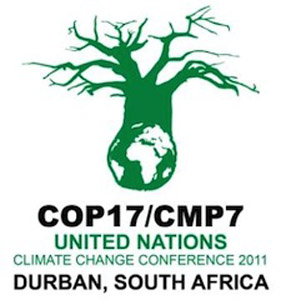COP17: Zuma calls for governments to be more ambitious

The Earth is in danger but deciding what to do is difficult
South African President Jacob Zuma has called on governments to be more ambitious as they search for agreement at the UN climate talks. The Earth is in danger, he said – but deciding what to do about it was a more difficult issue.
UN Secretary-General Ban Ki-moon also asked for more ambition, saying that the financial crisis should be a spur.
Twelve heads of state and about 130 ministers have until Friday to decide what outcome they want from the talks. Earlier in the day, their delegations heard analysts confirm that the Earth's surface is on course to warm by about 3.5C (6.3F) by 2100, rather than the 2C (3.6F) that governments have agreed as the maximum.
Opening the ministerial segment, Mr Zuma described the UN talks, in the coastal city of Durban, as "a decisive moment". He appealed for all governments to respect the tradition of multilateralism, describing climate change as "a global problem that requires a global solution". Decisions here need to reflect current and future concerns, he said.
"We are all agreed that the Earth is in danger, and we're all agreed that we must do something about it," he told delegates. "But the problem is when we've got to say what it is, and how."
Mr Ban said that movement towards a green economy was crucial in order to overcome not only climate change, but the coming shortages of natural resources. "The answer is clear, even if the exact path is not," he said.
Behind the scenes, ministers and their teams began to step up diplomatic activity in a series of multilateral and bilateral meetings.
The head of China's delegation, Xie Zhenhua, says a legally binding climate agreement is needed. Many delegates are particularly keen to discover how far and how fast China is prepared to go towards a future legally-binding agreement to drive emissions down. It is widely believed that China holds the key to whether the talks end with a breakthrough or a breakdown.
Many developing countries are also angered by the hard line being taken by the Indian delegation, which is holding to the line that only the traditional "developed" countries should have to engage in binding restrictions, despite the fact that some countries in the "developing world" bloc now have higher per-capita emissions and incomes.
Some African nations and small island states are keen to tell the Indian government that it risks isolating itself from the rest of the developing world bloc here.
There is also generalised frustration with the US. Despite President Obama's pledge three years ago to "lead the world" on climate change, many sources indicate that behind the scenes, his officials are blocking whatever measures they can.
Concern of countries that feel vulnerable to climate impacts has been fuelled by several recent analyses showing that current pledges made by governments are very unlikely to keep the rise in global average temperature since pre-industrial times below 2C.
Source BBC
Sustainable Tourism Report Suite 2011 Get your copy at a special offer price: HERE
 United Kingdom
United Kingdom United States
United States Asia Pacific
Asia Pacific












































Dozens fall ill in P&O Cruises ship outbreak
Turkish Airlines flight in emergency landing after pilot dies
Boy falls to death on cruise ship
Unexpected wave rocks cruise ship
Woman dies after going overboard in English Channel